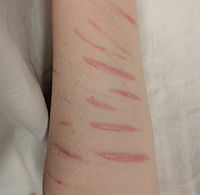
Photo from wikipedia
Poor sleep is associated with a higher risk of non-suicidal self-injury (NSSI) as a proxy of unfavorable emotion regulation. In the present study, we tested the hypothesis that past non-suicidal… Click to show full abstract
Poor sleep is associated with a higher risk of non-suicidal self-injury (NSSI) as a proxy of unfavorable emotion regulation. In the present study, we tested the hypothesis that past non-suicidal self-injury was associated with current non-suicidal self-injury and with current subjective sleep patterns. To this end, a larger sample of young adults were assessed. A total of 2374 adults (mean age: 27.58 years; 39.6% females) completed a series of self-rating questionnaires covering sociodemographic information, past and current NSSIs, suicide attempts, and current sleep patterns, including experiencing nightmares. Past NSSIs predicted current NSSIs. Current sleep patterns had a modest impact on the association between past and current NSSIs. Compared to male participants, female participants did not report more sleep complaints or more current NSSIs, but more past NSSIs. Past NSSIs predicted the occurrences of nightmares and suicide attempts. The best predictor of current NSSI was the remembered past NSSI, while current poor sleep was only modestly associated with current NSSI. Further indicators of current NSSI and poor sleep were suicide attempts and nightmares within the last six months. Overall, it appears that poor emotion regulation should be considered as underlying factor to trigger and maintain non-suicidal self-injury-related behavior and poor sleep. Further, unlike previous studies, which focused on the possible influence of sleep patterns on NSSIs, the aim of the present study paradigm was to investigate NSSIs on sleep patterns.
Journal Title: International Journal of Environmental Research and Public Health
Year Published: 2021
Link to full text (if available)
Share on Social Media: Sign Up to like & get
recommendations!